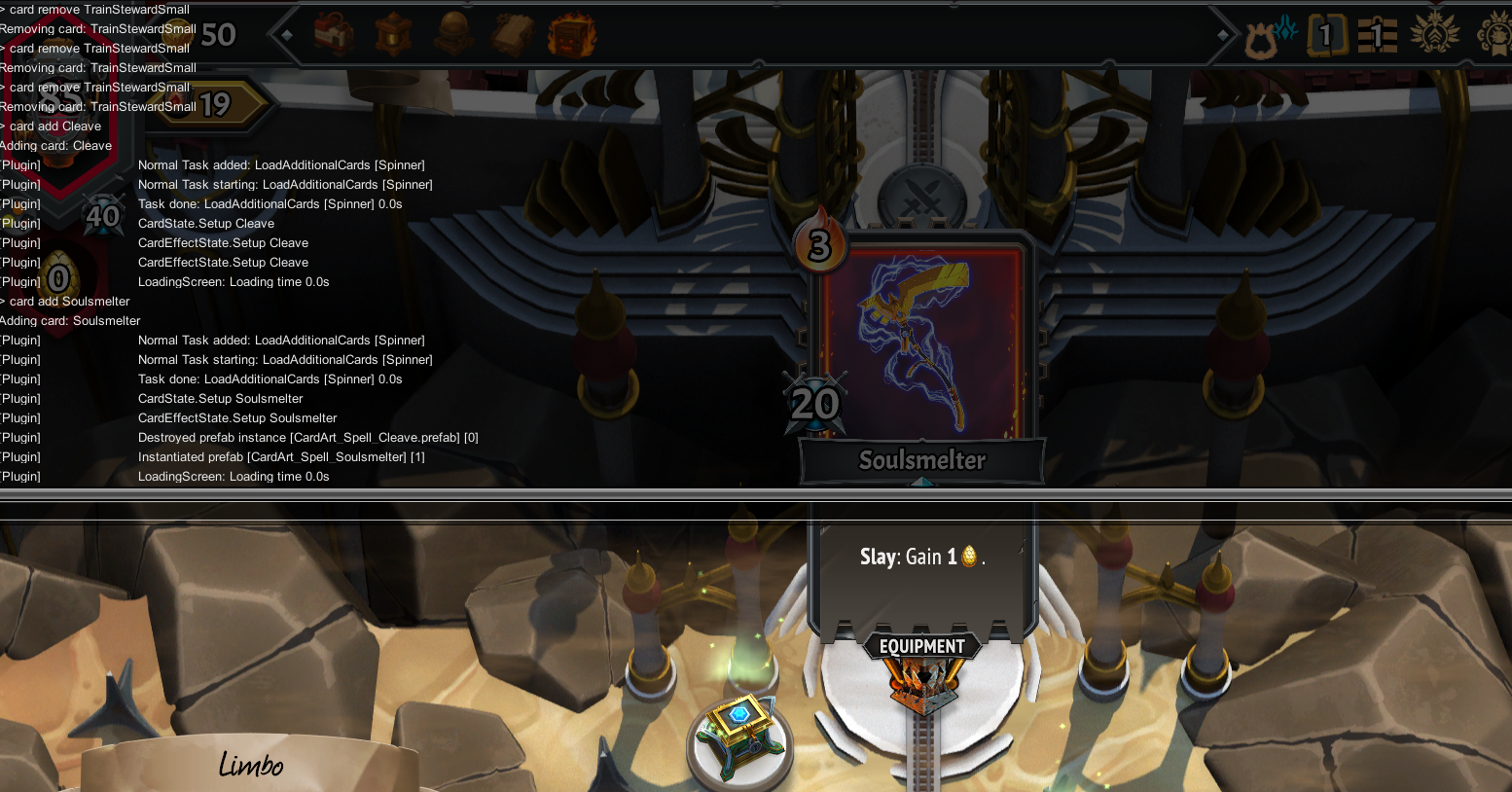
Stoker
Cheat Manager and ConsoleDetails
Stoker

A powerful cheat manager and console for Monster Train 2.
Features
- In-game console with command completion
- Command history navigation
- Real-time command suggestions
- Support for subcommands and options
- Customizable command system
- Log viewer with different message types (Info, Warning, Error)
- Fluent API for easy command creation
Installation
- Install BepInEx for your game
- Install Trainworks
- Place the Stoker plugin in the
BepInEx/pluginsdirectory - Start the game
How to Use
Opening the Console
- Press the backtick key (`) to toggle the console
Basic Usage
- Type commands and press Enter to execute them
- Use Up/Down arrows to navigate command history
- Press Tab to cycle through command completions
- Press Shift+Tab to cycle backwards through completions
Command Structure
Commands follow this general structure:
command [subcommand] [options] [arguments]
Available Commands
Help Command
help
Displays a list of all available commands and their descriptions.
Echo Command
echo <message>
Echoes back the provided message.
Card Commands
card add <card_name> [options]
card remove <card_name> [options]
Manage cards in the game.
Gold Command
gold <amount>
Add or remove gold. The amount can be positive or negative.
Relic Commands
relic add <relic_name> [options]
Add relics to your collection.
Command Completion
The console features intelligent command completion:
- Press Tab to cycle through available completions
- Completions are shown in semi-transparent gray
- Suggestions update in real-time as you type
- Supports completing:
- Command names
- Subcommands
- Option names
- Option values
- Argument values
Development
Using the Fluent API
The Fluent API provides a clean, readable way to create commands. Here are some examples from the codebase:
Basic Command
var command = new CommandBuilder("echo")
.WithDescription("Echo a message")
.WithArgument<string>("message")
.WithDescription("The message to echo")
.WithParser((xs) => xs)
.Parent()
.SetHandler((args) => {
if (!args.Arguments.ContainsKey("message"))
throw new Exception("Missing <message> argument");
var message = args.Arguments["message"];
if (message is null)
return Task.CompletedTask;
Plugin.Logger.LogInfo(message.ToString());
return Task.CompletedTask;
})
.UseHelpMiddleware();
Command with Options
var command = new CommandBuilder("gold")
.WithDescription("Manage gold")
.WithArgument<string>("amount")
.WithDescription("The amount of gold to add")
.WithParser((xs) => xs)
.WithDefaultValue("100")
.WithSuggestions(() => ["100", "+100", "-100"])
.Parent()
.SetHandler((args) => {
var arguments = args.Arguments;
if (!arguments.ContainsKey("amount"))
throw new Exception("Missing <amount> argument");
if (arguments["amount"] is not string amount)
throw new Exception("Invalid <amount> argument");
Plugin.Logger.LogInfo($"Adding {amount} gold to the player");
AccessTools.Method(typeof(CheatManager), "Command_AdjustGold").Invoke(null, [amount]);
return Task.CompletedTask;
})
.UseHelpMiddleware();
Command with Subcommands
var command = new CommandBuilder("card")
.WithDescription("Manage cards")
.WithSubCommand("add")
.WithDescription("Add a card to the deck")
.WithArgument<string>("name")
.WithDescription("The name of the card to add")
.WithSuggestions(() => [.. Railend.GetContainer().GetInstance<IRegister<CardData>>()
.GetAllIdentifiers(RegisterIdentifierType.ReadableID)
.Select(c => c.ToString())])
.WithParser((xs) => xs)
.Parent()
.SetHandler((args) => {
var arguments = args.Arguments;
if (!arguments.ContainsKey("name"))
throw new Exception("Missing <name> argument");
if (arguments["name"] is not string cardName)
throw new Exception("Invalid <name> argument");
Plugin.Logger.LogInfo($"Adding card: {cardName}");
CheatManager.Command_AddCard(cardName);
return Task.CompletedTask;
})
.UseHelpMiddleware()
.Parent();
Adding New Commands (In-Depth)
To add a new command, you can either use the Fluent API (recommended) or implement the ICommand interface directly for more control:
public class MyCommand : ICommand
{
public string Name => "mycommand";
public string Description => "My command description";
public void AddArgument(IArgument argument) { /* ... */ }
public void AddOption(ICommandOption option) { /* ... */ }
public void AddSubCommand(ICommand subCommand) { /* ... */ }
public void SetHandler(Func<HandlerArgs, Task> handler) { /* ... */ }
public Task ExecuteAsync(string[] args) { /* ... */ }
public string[] GetCompletions(string[] args) { /* ... */ }
}
Command Options
Commands can have options with:
- Required/optional flags
- Default values
- Aliases
- Value suggestions
- Custom parsers
Arguments
Commands can have positional arguments with:
- Required/optional flags
- Default values
- Value suggestions
- Custom parsers
License
This project is licensed under the MIT License - see the LICENSE file for details.